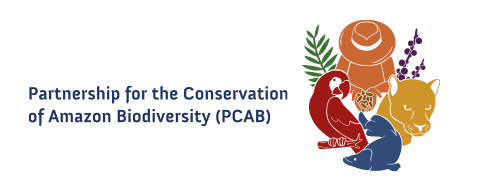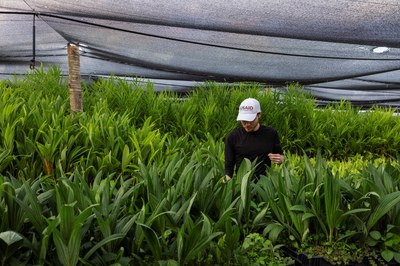ABF Adds Two New Projects and Increases Investments by R$ 85 Million
May/June, 2024 – The Amazon Biodiversity Fund (ABF), a private fund investing in projects and businesses with social and environmental impact in the Brazilian Legal Amazon, reached the milestone of R$85 million in investments with two new projects to expand investments in their portfolio, benefiting a total of seven companies since its launch.
In the beginning of 2024, the fund reached R$250 million of resource raising funds from two new investors: the National Bank for Economic and Social Development (BNDES) and Soros Economic Development Fund (SEDF). They joined forces with USAID, the Alliance Bioversity International – CIAT, the L'Oréal Fund for Nature Regeneration (LFNR), and ASN Impact Investors.
Impact Earth, an organization focused on positive impact investment, acts as an investment adviser to ABF. For Vincent Gradt, co-founder and managing director of Impact Earth, the focus is on projects that promote biodiversity conservation through degraded ecosystem restoration, carbon sequestration, and high social additionality with local communities in the Amazon.
“We aim to fill funding gaps and select companies with clear capacity for expansion. The fund is an innovative example of a blended finance instrument in Brazil, as its structure includes a first loss provision secured by an investment by the Alliance of Bioversity International and CIAT and an U.S. International Development Finance Corporation (DFC) 50% loan guarantee. In addition, it has an agreement with the Restoration Seed Capital Facility (RSCF) for technical assistance in investment development. Under our management, we have a focused team in Brazil, which allows us to establish solid relationships with the local ecosystem,” explains Vincent.
The first of the new projects involves Cacau Amazônia+, a new company incubated by the RioTerra Study Center and other partners, operating in 10 municipalities in Rondônia. R$18 million will be invested in total and added to other resources, for agroforestry and ecological restoration systems. The innovative blended finance structure benefits 200 small farmers. This business model aims to strengthen cocoa production associated with other products such as bananas and açaí, thus promoting local economic development.
The second project in the Amazon region was developed by Belterra Agroflorestas, an agroforestry model that will receive R$20 million to work with small and medium-sized producers in the states of Mato Grosso, Pará, and Rondônia. This project is part of the company's strategy of implementing agroforestry on a large scale across Brazil, reaching 40,000 hectares of restored land by 2030.
“These investments mark an important step for the ABF in its mission to promote sustainable development in the Amazon, attracting private investment for critical issues such as biodiversity conservation and natural resource management, always with an eye on positive social impact, and generating opportunities to improve income and quality of life for the local population,” adds Impact Earth’s investment manager in Brazil, Andrea Resende.
Follow-on Investment – In addition to new projects, Impact Earth promotes the continuous development of the existing companies in their portfolio (follow-on investment). An additional R$10 million (totaling R$16 million) was allocated to Inocas Amazônia, a company that aims to disseminate agroforestry systems with macaúba in the Amazon and create a new value chain. Macaúba can be used as an alternative source of vegetable oil, with zero deforestation and a focus on sustainable production and fair trade.
The second follow-on investment provided R$7 million (totaling R$11 million) to Horta da Terra, an Amazon ingredient agribusiness enterprise that promotes biodiversity by cultivating non-conventional food plants (PANCs, in the Portuguese acronym) in a regenerative-syntropic system and transforms them in dehydrated (lyophilized) “super ingredients”, with extended shelf life for decades and concentrated functional and nutritional properties, to be used in foods, supplements, and cosmetics. The new investment aims to enable the company to build a new higher-capacity plant and advance in market development, targeting new customers—especially in the international market.
“With these seven investments, we have acquired significant experience. The ABF will further accelerate investment in new businesses by 2025—our goal is to have invested in 15 companies by the end of next year. Once we have invested all available resources, we will continue with the development of new funds, possibly one in another continent and another one in Brazil, to continue the work started with the ABF,” says Resende.
History – The ABF has seven companies in its portfolio (including new investments):
- Amazônia Agroflorestal, which engages farmers in the recovery of degraded areas through agroforestry systems, with a focus on coffee;
- Reforesterra/Agro Verde, a collaboration between Rioterra and Reforest'Action for the reforestation of 2,000 hectares of permanent protection areas on small rural properties in Rondônia;
- Manioca, a food brand that promotes Amazon ingredients and flavors;
- Horta da Terra, a company that produces non-conventional food plants from the Amazon in a regenerative-syntropic system, including jambu, taioba, and cariru; and
- Inocas Amazonia, a company that plants macaúba in an agroforestry system as an alternative source of vegetable oil.
- Cacau Amazônia, which develops the cocoa production chain with small farmers in Rondônia, promoting agroforestry systems and ecological restoration.
- Belterra Agroflorestas, which works with restoration through large-scale agroforestry in Brazil, working together with small and medium-sized farmers.



